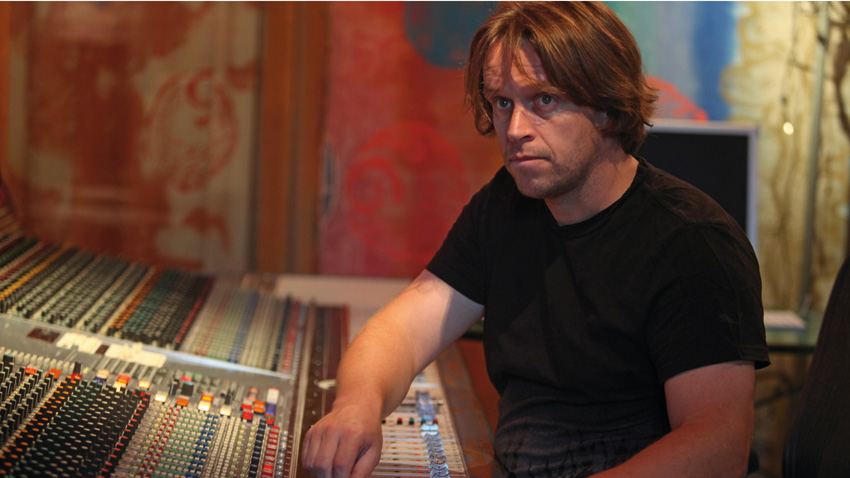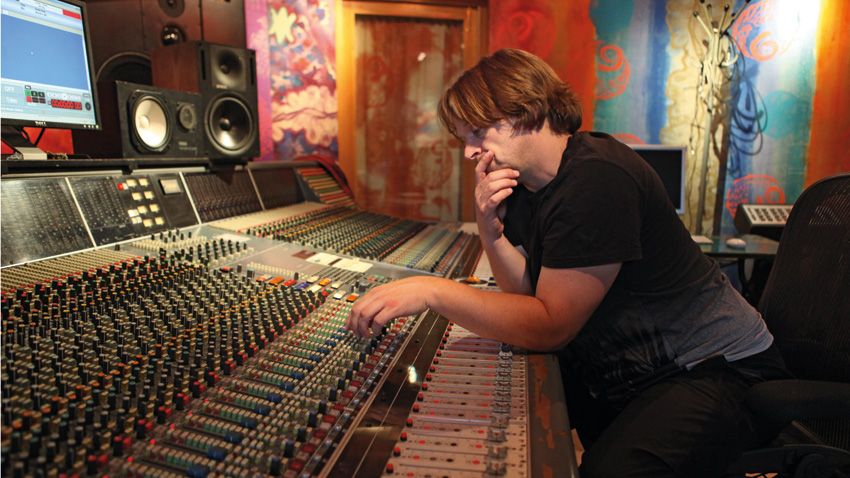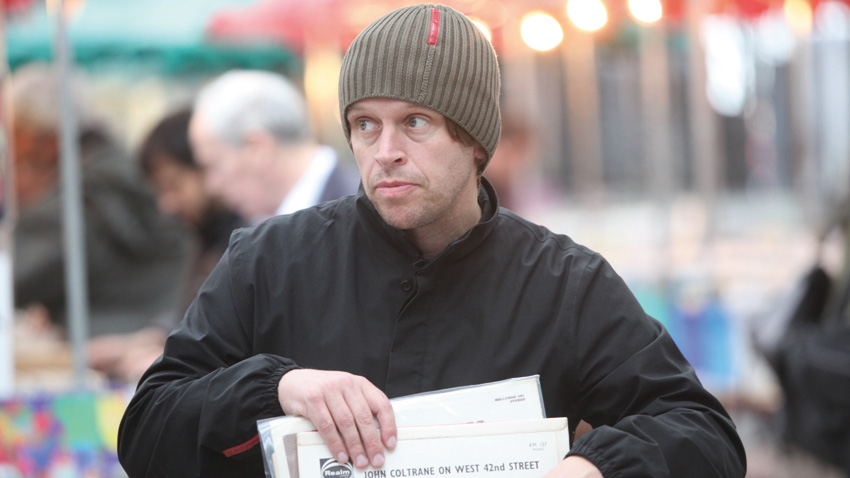Chicane on switching to software and the state of trance
Nick Bracegirdle" "I sometimes sit in front of my Mac, looking back at those early days and think, 'How did we manage?'"

Chicane's Nick Bracegirdle can't help smiling when he talks about his first studio - a spare room full of crackly and out-of-tune hardware at his parents' house in Chalfont St Giles. "I used to mix down on my dad's old hi-fi amp," he chuckles.
Few people walking past that sleepy, suburban front garden would have guessed that it was the place where huge club hits like Offshoreand Saltwater were recorded. Mind you, the yellow Ferrari in the front garden would have been a bit of a giveaway!
Almost 20 years after the success of those early singles, Bracegirdle is putting together a new album (out at the end of July) at his studio in… the French Alps. Quite a change from rural Buckinghamshire!
"Yeah, I like mountains. I like to snowboard. I've got a place in the Alps and a place up in Scotland, with a studio in each. Working in different studios was a logistical nightmare in the pre-computer days. Can you imagine having to double up on everything? And even if you did double up on something like a Roland SH-101, chances were that the two machines wouldn't sound the same. Hands up if you used to take Polaroid pictures of the mixing desk, just so you could remember all the settings!
"God, I sometimes sit in front of my Mac screen looking back at those early days and think, 'How did we manage? How did we ever finish a song?'"
You didn't mind moving over to a computer-based studio, then?
"That's the weird thing… I was really, really reluctant to move over from hardware. I was a Cubase user right from the early days of the Atari, so I can remember when they first introduced Cubase Audio. It was an interesting idea, but in the studio, it was horrendous. There was this thing called the 'audio pool', and that's exactly what it was - a big, murky pool where you fished around hoping to find the bit of audio you'd just recorded!
Get the MusicRadar Newsletter
Want all the hottest music and gear news, reviews, deals, features and more, direct to your inbox? Sign up here.
"I was a Cubase user right from the early days of the Atari, so I can remember when they first introduced Cubase Audio. It was an interesting idea, but in the studio, it was horrendous."
"As someone who'd grown up on sequencing and hardware, I found the whole idea of digital audio a bit alien. Committing something to audio meant that it was set in stone; that was it, no turning back, no more tweaking. That wasn't how I worked; I was used to having everything running live and being able to tweak and change a sound right up until the last minute."
What changed your mind?
"I was working with Nick Coler [former KLF associate who went on to work with the likes of Girls Aloud] and he started introducing me to the whole idea of audio manipulation. Even after it was in the computer, you could still mess around with it. 'Right, I get it!'
"That happened to be around the same time that software modelling was getting a bit more advanced, and all of a sudden, my old hardware started to disappear from the studio. We won't need that today - we can do it in the computer. Eventually, I just moved over totally to Logic."
Any regrets?
"Ha! Are you kidding? Look at any modern arrangement on the computer screen and try to imagine making that song using hardware and a mixing desk. I guess it can all be summed up in one word: automation. You'd need a dozen pairs of hands and an awful lot of pre-planning to do all that on a mixing desk!
"It took a while for the technology to really get up to speed and show us what it could do, but once we got there, we couldn't turn back. For instance, I'm working on the new Chicane album at the moment, and I've got about half a dozen tracks on the go, plus I took a two-week break to do some soundtrack work [Bracegirdle has supplied the theme tune to Matthew 'Friends' Perry's remake of the classic TV sitcom The Odd Couple].
"Look at any modern arrangement on the computer screen and try to imagine making that song using hardware and a mixing desk. I guess it can all be summed up in one word: automation"
"In the old days, you started a track, you finished it and you moved onto the next thing. It had to be like that because switching between tracks was such a faff - especially if you were using a knackered old bit of analogue synth hardware that wasn't behaving itself. Invariably, you would listen to a 'finished' track and think, 'Damn! Those drums need more compression… The synths need more reverb…' But getting the track back up on the desk was such a headache that you'd end up leaving it. The end result was always a bit of a compromise.
"Now, I can come and go as I please. I can mix down, leave it for a couple of weeks, come back, have a tweak, leave it, tweak, mix down as many times as I want. I can give myself a bit of distance and perspective - that's when I know if a song is good enough to go on the album."

What's your current setup?
"The brains are provided by an eight-core Mac Pro, going through a MOTU 828, with a bit of help from a Focusrite VoiceMaster for vocals and a Mackie Big Knob. I'm still on Logic 9 at the moment, but I'm not going to upgrade until I've finished the album. The whole studio needs a bit of a spruce up, and it would be ridiculous to do that while I've got so much on the go.
"In terms of synths, I naturally tend to gravitate towards software versions of classic gear like the ARP 2600, the 101 and the Prophet, because I'm used to how they work and I know what sort of sounds they're capable of. I've also been experimenting with some of the SID chip software, which I suppose is from that same analogue era. Yes, I also use Sylenth1 and Trilian, but I always steer clear of the super-huge, all-singing, all-dancing machines like Predator - although they sound amazing, they gobble up so much of your processor.
"There was a period where everyone was saying, 'You've gotta get Nexus - it's perfect for trance.' When I hear that, I'm always suspicious. It sounds too much like joining the dots and trying to make a sound that fits every song."
Do you mind people calling your music trance?
"It's been happening for almost 20 years now, so it's a bit late for me to start complaining! I'm not even sure what 'trance' means any more. I suppose, in the late '90s, there was a sound that everybody understood to be trance, but I was talking to Ferry Corsten about this the other day - we've collaborated on a couple of tracks on the new album - and we couldn't help but smile about the whole resurgence of the trance thing.
"Chicane has never just been one sound or one style. What I've tried to do is make widescreen dance music - some of it is commercial and poppy; some of it is for the clubs. I hope that what I've achieved has been more than a simple one-word label."
Has the way you write songs changed much in those 20 years? Does the modern studio make it easier to create 'widescreen dance music'?
"The answer to that question is… yes and no. Ever since I got my first bits of kit - a Casio MT-65, an SH-101 and a Dr. Rhythm - songwriting has always been about melody. That's why I was always such a big fan of people like Vince Clarke and Jean Michel Jarre. They wrote great songs - songs with hooks and harmonies and emotion. In that sense, my approach is still the same: around 90% of the time, a song will start with a melody.
"But if you look at the way the studio works technically, then songwriting is a totally different beast. My first reverb was a guitar effects pedal… a piece of crap. Now, I've got Valhalla [DSP]. I've seen people talk about it in the tech mags before and, yes, it really is that good! Shimmer and VintageVerb is on everything I do, from the smallest touches to the huge sweeps that can take a song way off into the distance.
"Like I said before, songwriting always used to be a compromise. Not any more… Now you can get an idea into the computer and it sounds better than it did in your head!"
In one interview, you said something about getting a sonic 'mood board' together when you first start a song…
"You know how artists or designers pull together a selection of sketches or fabrics or pictures when they start a project? Well, I do something similar with music. If I get an idea, rather than try and finish the song there and then, I just play 20 things in that style… find some pads, leads, drum and percussion loops. Not necessarily looking for things that will fit in the song; they are literally just suggestions; something to help you gauge which way the song needs to go."

Does your process involve a 'mixing' stage? Or, with processing and effects playing such an integral part in the sound, do songs tend to, er, 'grow' towards a final version?
"Yeah, that's a great way of putting it. They grow and evolve. I'm working on this track at the moment, with a very heavily effected piano - so effected that it doesn't really sound like a piano. It would be impossible to just put the nuts and bolts of a song together and then paint on all the effects and the 'widescreen bit' during mixdown. The effects move with the song - they're part of it in the same way that the bassline is, or the drum part.
"I suppose the thing that does happen at the end is a sort of rationalisation of the song. During the recording, I tend to overdo the parts, and I overdo the levels a bit. Rich [engineer, Rich Searle] comes in and just strips things back.
"There are tweaks, of course, but all the 'riding' of the faders, the structure, the edits… all the main stuff is sorted. There's not even much in terms of compression, especially on the downtempo stuff. I like to keep the feel of it quite real and natural. I'm more likely to rely on levels and placement - perhaps chopping a hook a little bit early - to create space for the sound."
There are a couple of guest vocalists working with you on the new album, including Lisa Gerrard, who worked on the Gladiator soundtrack with Hans Zimmer.
"I like the idea that Chicane is not just electronics and machines; the organic, human bits are often the most musical. It's the same with things like guitars. Over the years, I've regularly fudged guitar parts with samples and sequencers, but if you take the time and trouble to get somebody to play it, it always sounds better.
"You asked me before if there were any regrets about technology's shift to digital and plugins. I suppose that would be my one complaint. Technology can - if we're not careful - make things a little bit formulaic. It happened in the old trance days. After that initial burst of creativity and inventiveness, it all started to get a bit samey. Everybody got hold of the same machines and everybody started churning out the same sounds.
"It's so easy to make a great-sounding track with huge dynamics and all the bells and whistles, but don't forget the tune, and don't forget the melody, because they're the things that will ensure your song will still be played in ten, 15 or 20 years."
"Today, you've got a similar thing happening on a much bigger scale. It's so easy for anyone to get hold of the tools to make dance music, and some of those tools do so much of the work for you that content and quality begins to suffer. I was in the studio the other day listening to some library packs that even included builds and drops. It's a song in a box.
"It's so easy to make a great-sounding track with huge dynamics and all the bells and whistles, but don't forget the tune, and don't forget the melody, because they're the things that will ensure your song will still be played in ten, 15 or 20 years. Even with all this technology at our disposal, it's our ears that still need to be in control."
No More I Sleep is out now on iTunes. Find out more on the Chicane website. For Chicane booking info head over to the MN2S Agency.


Computer Music magazine is the world’s best selling publication dedicated solely to making great music with your Mac or PC computer. Each issue it brings its lucky readers the best in cutting-edge tutorials, need-to-know, expert software reviews and even all the tools you actually need to make great music today, courtesy of our legendary CM Plugin Suite.
“The included sample content is not only unique but sonically amazing, as it always was”: Spitfire Audio BBC Radiophonic Workshop review
“We were able to fire up a bass sound that was indistinguishable from the flavour of New Order’s Blue Monday in seconds”: EastWest Sounds Iconic review










